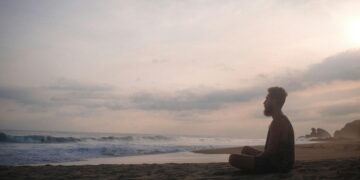Table of Contents
My name is Alex, and for the last seven years, I’ve been a professional software developer.
But my journey didn’t start in a university computer science Lab. It started with a 10-hour YouTube video and a soul-crushing moment of failure in front of a blank screen.
Like so many others, I was drawn to Python.
I read about its “simple,” English-like syntax and the incredible career opportunities it unlocked in fields from data science to web development.1
I bought into the promise that it was one of the best starter languages for novice programmers.1
So, I did what everyone does: I found a popular, highly-rated video course and dedicated a full week to it.
I watched every second, took meticulous notes, and nodded along as the instructor effortlessly built project after project.
I felt productive.
I felt like I was learning.
Then, the course ended.
High on my new “knowledge,” I decided to build something on my own—the classic beginner project, a simple command-line calculator.
I opened my code editor, typed main.py, and stared at the blinking cursor.
Nothing.
My mind was a complete blank.
I could remember the instructor talking about functions and loops, but I couldn’t summon the logic to start.
The syntax I had just spent hours “learning” was a foreign language again.
It was a paralyzing, deeply frustrating feeling that many aspiring developers know all too well—the agony of realizing that watching someone code is not the same as knowing how to code.3
I had fallen into the chasm between following and creating, a place now infamously known as “tutorial hell.”
The Mirage of Progress: Why Following Along Isn’t Learning
My failure with the calculator project sent me right back to the source of my false confidence: more tutorials.
I thought maybe a different instructor or a different course would be the key.
This began a vicious cycle.
I would consume hours of content, feel that familiar, fleeting sense of accomplishment, and then freeze the moment I tried to apply the knowledge to a new problem, even a simple one on a site like HackerRank.5
This cycle is the very definition of “tutorial hell”: a state where you can follow guided examples perfectly but are incapable of building anything independently.6
It’s a particularly cruel trap because it feels like you’re making progress.
You’re putting in the hours, but the skills aren’t sticking.
The reason for this lies in a fundamental misunderstanding of how our brains learn a skill like programming.
Passively watching video tutorials primarily engages your recognition memory.
You see a line of code and think, “Yes, I recognize that.
I’ve seen it before.” But programming is not an act of recognition; it is an act of creation that requires active recall.8
Active recall is the process of retrieving information from your brain without a prompt, forcing your mind to build and strengthen the neural pathways necessary for problem-solving.
Video tutorials, by their nature, remove the most important ingredient for learning: productive struggle.
They present a polished, linear path to a solution, editing out the messy, non-linear reality of coding, which is filled with bugs, dead ends, and constant searching for answers.8
You’re watching a highlight reel of a finished product, not learning the thought process that created it.
This creates an illusion of competence.
You’ve consumed the information, but you haven’t forged it into actual skill.
The core difficulty in programming isn’t memorizing syntax; it’s learning how to “think like a programmer”—a skill that involves breaking down problems into logical steps and creating an algorithm to solve them, something tutorials are uniquely ill-equipped to teach.3
The Culinary Epiphany: Learning to Code is Learning to Cook
Beaten down by my lack of progress, I took a break from the screen and turned to another hobby: cooking.
I had always been interested in it, but my approach was timid.
I followed recipes with military precision, measuring every ingredient down to the gram.
My dishes were okay, but they lacked soul.
And if I was missing a single ingredient, the whole endeavor felt impossible.
One day, I decided to learn how to make a proper béchamel sauce from scratch—that foundational “mother sauce” of French cuisine.
I learned the technique: melt butter, whisk in flour to make a roux, and slowly add warm milk until it’s smooth and creamy.
The first few attempts were lumpy disasters.
But eventually, I got it right.
And then something clicked.
I realized that with this one core technique, I could do more than just make the one dish in the recipe.
I could add cheese to make a Mornay sauce for macaroni and cheese.
I could add herbs and use it as a base for a casserole.
I could thin it out for a soup.
I hadn’t just learned a recipe; I had learned a technique.
That was my epiphany.
I had been approaching Python all wrong.
Learning to code is not like learning a spoken language; it’s like learning to cook.
This mental model reframed my entire approach.
It revealed two distinct roles, and I had been stuck in the first one:
- The Recipe Follower (The Tutorial Coder): This person can execute a set of instructions flawlessly. Give them a step-by-step tutorial for a “To-Do List App,” and they will produce a perfect To-Do List App. But ask them to build a simple “Contact Book” on their own, and they are completely lost. They know the steps for a specific outcome but don’t understand the underlying principles. This is the state of a programmer trapped in tutorial hell, engaging in what some call “recipe programming”.12
- The Chef (The Problem-Solving Programmer): This person understands the fundamental techniques of their craft. A chef knows how to sauté, braise, and emulsify. They understand flavor profiles and heat management. With these core techniques, they can adapt recipes, improvise with the ingredients they have, and create entirely new dishes from scratch. This is the goal for a programmer. A “Chef Programmer” understands core concepts like data structures, control flow, and problem decomposition. They can then combine these “techniques” to build a To-Do List App, a Contact Book, or anything else they can imagine.
The standard advice for beginners inadvertently trains them to be Recipe Followers.
It focuses on completing specific projects (recipes) instead of mastering the transferable skills (techniques) needed to become a genuine creator.
The Three Stages of Your Culinary Journey in Code
Armed with this new paradigm, I developed a three-stage journey for myself.
It’s a path that takes you from a passive Recipe Follower to an active Home Cook, and finally, to a creative Python Chef.
Stage 1: The Recipe Follower (Know Your Ingredients)
Every chef must first learn their ingredients.
You can’t cook if you don’t know the difference between salt and sugar, or a whisk and a spatula.
This initial stage is about learning the absolute basics of Python’s syntax.
- Core Mindset: “My goal is to understand the tools and vocabulary.”
- Primary Activity: This is the one and only phase where tutorials and books are your primary tools. Your goal is not to build complex projects but to gain a working vocabulary of Python’s fundamental building blocks.
- What to Learn:
- Variables and Data Types: strings, integers, floats, booleans.
- Data Structures: The core containers like lists, dictionaries, and sets.
- Control Flow: if/elif/else statements and for/while loops.
- Functions: How to define and call your own reusable blocks of code.
- The Trap to Avoid: Do not stay here for more than a few weeks. The purpose of this stage is to stock your pantry with ingredients. It is not to learn how to cook. The knowledge you gain here is passive and will fade quickly if not put into active use.13
Stage 2: The Home Cook (Making Your First Meals)
This is the most critical—and often most difficult—transition.
It’s where you stop passively consuming and start actively creating.
A home cook doesn’t invent new cuisines; they start by making simple, functional meals.
They might burn the toast a few times, but they are cooking.
This is where you escape tutorial hell.
- Core Mindset: “My goal is to build something that works, no matter how simple or messy.”
- Primary Activity: The “Modify, Then Create” Cycle. This cycle is the engine of skill development.
- Follow a Recipe Once: Pick a small, high-quality tutorial for a classic beginner project. Ideas include a number guessing game, a simple calculator, or a text-based tic-tac-toe game.14 Follow it carefully and build the project exactly as instructed.
- Modify the Recipe: This is the crucial step most beginners skip. Immediately after finishing, start a new file and rebuild the project, but this time, change something. Add a new feature. If you built a calculator, add an exponent ** operator. If you made a guessing game, add difficulty levels that change the number range. This forces you to move from rote copying to active problem-solving. It’s the coding equivalent of adding a new spice to a familiar recipe to see what happens.16
- Create a New Dish from Memory: After successfully modifying the project, try to build a similar but different project from scratch. If you built a number guessing game, now build a word guessing game (Hangman). Use your previous project and official documentation as a reference, but resist the urge to watch another video tutorial. This step solidifies the underlying techniques you’ve learned.
- Embrace the Mess: Your code in this stage will be clumsy and inefficient. You will spend more time on Google and Stack Overflow than in your code editor. You will be frustrated by error messages.11 This is not a sign of failure. This is the learning process in action. Learning to debug a
ValueError is the equivalent of learning why your sauce broke and how to fix it. It is the most valuable training you can get.17
Stage 3: The Python Chef (Mastering the Craft)
Once you’re comfortable as a Home Cook—able to build small projects without constant guidance—you can begin the journey to becoming a Chef.
This is about moving beyond just making things work and toward understanding why they work and how to make them work better.
It’s about developing elegance, efficiency, and a deep, intuitive understanding of the craft.
- Core Mindset: “My goal is to understand the fundamental principles behind the code.”
- Primary Activity: Deliberate Practice of Core Techniques.
- Understanding “Kitchen Science” (Data Structures & Algorithms): A chef knows that a delicate sauce requires a whisk, not a wooden spoon. A Python Chef understands the practical differences between a list and a dictionary. They know that iterating through a list to find an item is slow, while looking up an item in a dictionary by its key is fast. This isn’t abstract academic theory; it’s the practical science of writing efficient code that doesn’t waste time or memory.18
- Learning “Cuisines” (Frameworks & Libraries): A chef might specialize in Italian or Japanese cuisine. A Python Chef begins to explore specialized libraries and frameworks. If you’re interested in web development, you learn Django or Flask. For data science, you dive deep into Pandas, NumPy, and Scikit-learn.2 This learning is now far easier because you have a solid foundation in the core “cooking techniques” of the language.
- Developing “Taste” (Writing Clean Code): A great chef cares about plating and presentation. A great programmer writes code that is clean, readable, and easy for others (and their future self) to understand. Beginners often end up with “jumbled” code.5 A Chef learns to refactor their work, organize it into logical modules, and follow community best practices like PEP 8.
This approach intentionally inverts the traditional university curriculum, which often starts with heavy theory.20
By building practical projects first (becoming a Home Cook), you develop a tangible context and a genuine
need for the deeper theory.
You’re not just learning about algorithms in the abstract; you’re learning how to make your own working program run faster.
This creates a powerful, context-driven motivation that makes the knowledge stick.
Your Path to the Python Kitchen: A Practical Roadmap
To put this all together, here is a simple framework for your journey.
Identify which stage you’re in and focus on the corresponding mindset and activities.
This table is your guide to moving from a passive Recipe Follower to a creative Python Chef.
| Stage | Core Mindset | Primary Activity | Recommended Resources & Goals | |
| Recipe Follower | “I need to learn the words.” | Learning core syntax via high-quality, interactive resources. | Interactive tutorials (e.g., from freeCodeCamp, Codecademy), foundational books (“Automate the Boring Stuff with Python”). Goal: Understand variables, data types, loops, functions. | |
| Home Cook | “I need to make a meal.” | Building small, tangible projects using the “Modify, Then Create” cycle. | Beginner project lists 14, guided project tutorials (to be modified), Stack Overflow (for debugging). | Goal: Build 3-5 small projects from scratch. |
| Python Chef | “I need to understand the science.” | Deliberate practice of CS fundamentals and specialized tools. | Algorithm practice sites, official documentation for libraries (e.g., Django, Pandas), books on software design. Goal: Understand why certain code is better/faster. |
Conclusion: Stop Following, Start Creating
I eventually did build that simple calculator.
It was messy and clunky, but it was mine.
I built it not by finding a better video, but by changing my entire philosophy of learning.
I stopped being a passive consumer of recipes and became an active participant in my own kitchen.
The frustration I felt in front of that blank screen wasn’t a sign that I wasn’t smart enough to code; it was a symptom of a broken learning strategy that plagues millions of beginners.
True learning is an active, creative, and often messy process.
It happens in the struggle of debugging, in the small victory of a new feature working, and in the flash of insight when you adapt an old technique to a new problem.
If you’re feeling stuck, know that you are not alone and you are not incapable.
You are simply a cook who has been given a library of recipes but has never been taught how to light the stove.
The path forward is not to find more recipes.
It’s to pick up your tools, accept that you’ll make a mess, and start cooking.
Close the Video. Open your editor.
Your first meal awaits.
Works cited
- Is Python Hard to Learn for Beginners? – Noble Desktop, accessed August 10, 2025, https://www.nobledesktop.com/learn/python/how-difficult-is-it-to-learn-python
- Need Some Motivation for Learning Python? | LearnPython.com, accessed August 10, 2025, https://learnpython.com/blog/motivation-for-learning-python/
- Learning python and feel frustrated : r/learnpython – Reddit, accessed August 10, 2025, https://www.reddit.com/r/learnpython/comments/qqr5xh/learning_python_and_feel_frustrated/
- Learning python is making me cry and go crazy – Reddit, accessed August 10, 2025, https://www.reddit.com/r/learnpython/comments/1dgo5ji/learning_python_is_making_me_cry_and_go_crazy/
- Python Education – Reddit, accessed August 10, 2025, https://www.reddit.com/r/learnpython/
- I feel like I’m in tutorial hell : r/learnpython – Reddit, accessed August 10, 2025, https://www.reddit.com/r/learnpython/comments/1guwv05/i_feel_like_im_in_tutorial_hell/
- How to Escape Tutorial Hell. The best strategy to create a healthy …, accessed August 10, 2025, https://medium.com/byte-sized-data/how-to-escape-tutorial-hell-8e5a93f6f07f
- Does anyone else think video tutorials do more harm than good? : r …, accessed August 10, 2025, https://www.reddit.com/r/learnprogramming/comments/iig1h1/does_anyone_else_think_video_tutorials_do_more/
- Learn Spaced Repetition Today: Don’t Let Your Coding Skills Fade …, accessed August 10, 2025, https://snappify.com/blog/spaced-repetition
- Programming Tutorials Are A Lie – YouTube, accessed August 10, 2025, https://www.youtube.com/watch?v=uIOhRD9J9oU
- How Hard Is It to Learn Python & How to Do It from Scratch? – Mimo, accessed August 10, 2025, https://mimo.org/blog/how-hard-is-it-to-learn-python
- Recipe Programming – Geoffrey Challen, accessed August 10, 2025, https://www.geoffreychallen.com/essays/2021-06-03-recipe-programming
- How Long Does it Take to Learn Python? (+ Tips for Learning) – Coursera, accessed August 10, 2025, https://www.coursera.org/articles/how-long-does-it-take-to-learn-python-tips-for-learning
- Python Projects for Beginners: 60+ Ideas to Build Your Portfolio – Dataquest, accessed August 10, 2025, https://www.dataquest.io/blog/python-projects-for-beginners/
- Project-Based Practice Ideas for Teaching Python Programming in Classroom – CodeEasy, accessed August 10, 2025, https://codeeasy.io/blog/project-based-practice-ideas-for-teaching-python-programming-in-classroom
- How do I go from simply following recipes to “knowing how to cook …, accessed August 10, 2025, https://www.reddit.com/r/AskCulinary/comments/dcs391/how_do_i_go_from_simply_following_recipes_to/
- Simple Calculator Help – Python Forum, accessed August 10, 2025, https://python-forum.io/thread-18561.html
- Thoughts on teaching good programming skills versus computer science? – Reddit, accessed August 10, 2025, https://www.reddit.com/r/computerscience/comments/smanmb/thoughts_on_teaching_good_programming_skills/
- Full Stack Python, accessed August 10, 2025, https://www.fullstackpython.com/
- Does A Computer Science Degree Teach You Practical Coding …, accessed August 10, 2025, https://academichelp.net/blog/coding-tips/does-a-computer-science-degree-teach-you-practical-coding.html






